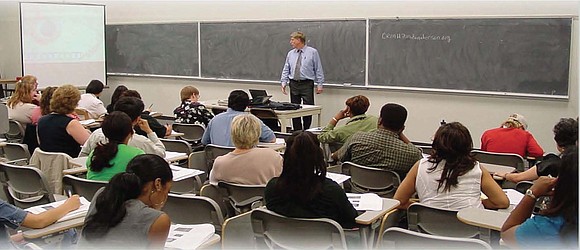Lovell' Food For Thought - Has HDEART/ICC had an Impact?
Will those impacted respond to a survey/
11/6/2017, 6 a.m.

In 1987, we launched the Biennial Symposium on Minorities, the Medical Underserved & Cancer. Fifteen year later, we launched the Health Disparities, Education, Awareness, Research & Training Consortium (HDEART-C) (www.hdeartconsortium.org). Since 2002, the first class in 2002 with 26 students, 21 graduate students and five graduates, and Dr. Francis Collins, now Director of the National Institutes of Health, as the inaugural speaker, we have had over 5000 individuals then the Disparities in Health in America: Working Toward Social Justice Course & Workshop.
Over the years, we have had individuals tell us of how the course/workshop was a life changing experience. We have posted on the HDEART-C web site. “I attended my first summer workshop in 2003 while a doctoral student. It was a life-changing experience. I was surrounded by the crème de la crème of scholars dedicated to studying, preventing and eliminating health disparities. Several of these esteemed individuals were women and people of color, which is not a minor point to take for granted. Indeed, at the time I was the sole Black doctoral student in my program and subsequently became the first Black woman to earn a PhD from that program. Thus, it was profoundly moving and motivating to be surrounded by like-minded people representing both veteran scholars, experienced practitioners, and us student rookies. There was a vibrant energy emanating from the speakers and panelists, as well as from the audience members. I no longer felt alone.
In 2005 while a junior faculty member, I direly wanted to attend but did not wish to fly as I was pregnant. My spouse drove me 1,058 miles through 6 states so that I could participate. Once again, I left the workshop with renewed vigor to tackle our nation’s issues with health inequities. This second experiences cemented my commitment to a career focused on eliminating health disparities.
Since my arrival to Texas in 2006, I have made it a priority to be as involved as possible with this workshop. One of the highlights of my career was being asked to present at the workshop! What a culminating experience. I actually thought things could not get better. But I was wrong. This year, not only am I co-chair and thus able to work hand-in-hand with THE Dr. Lovell Jones, I have a former student mentee presenting!”
This was almost 15 years ago. We have collected numerous comments like the above, but the question that has been asked is how common are these anecdotal comments. Has the course/workshop had an impact on the trajectory of those who have taken them. Well, we have implemented an IMPACT SURVEY. One of the responders recently stated. “I have only recently begun participating in these programs, but their impact on my career development has been immediate and substantial.”
The question now is how do we get enough people to respond to the survey to officially document its impact? I'm not one who routinely does surveys. My training is as a bench scientist who saw that what I did at the bench was not make a difference unless it was translated into the language of the real world. And then realized that it if was not translated by people who looked like me and/or had the personal experiences to understand how to translate it, it would be lost in the translation. For who you are shapes how you look at problems and the solutions you come up with.
This realization ultimately led to the launching of HDEART-C. Creating an educational program that provides everyone with the common experience that to solve the issue of health inequities, it has to be approached in a biopsychosocial manner and the mantra that health alone will not solved the health crisis that face this nation, especially health inequities. To connect the dots, we created the HDEART Health Equity Scholars & Alumni Network.
However, to keep all of this moving forward, one has to show that there is a return on investment (ROI), and that return is its impact on people. This is where the survey comes in. However, a survey is only good when those who have been impacted respond. The question now is how to get enough of the more than 5,000 individuals who have attended the Disparities in Health in America: Working Toward Social Justice Course/Workshop, and the additional individuals who participated in the Biennial Symposium Series on Minorities, the Medical Underserved & Cancer and the Intercultural Cancer Council & Network Educational Programs? I am open to any suggestions, because this is truly not about me, but the next generation. In preventing them from reinventing the wheel. For as I wrote a few months ago Reinventing the Wheel that be detrimental to progress, especially in addressing health inequities (http://stylemagazine.com/news/2017/aug/18/lovells-food-thought-reventing-wheel-threat-progre/)







